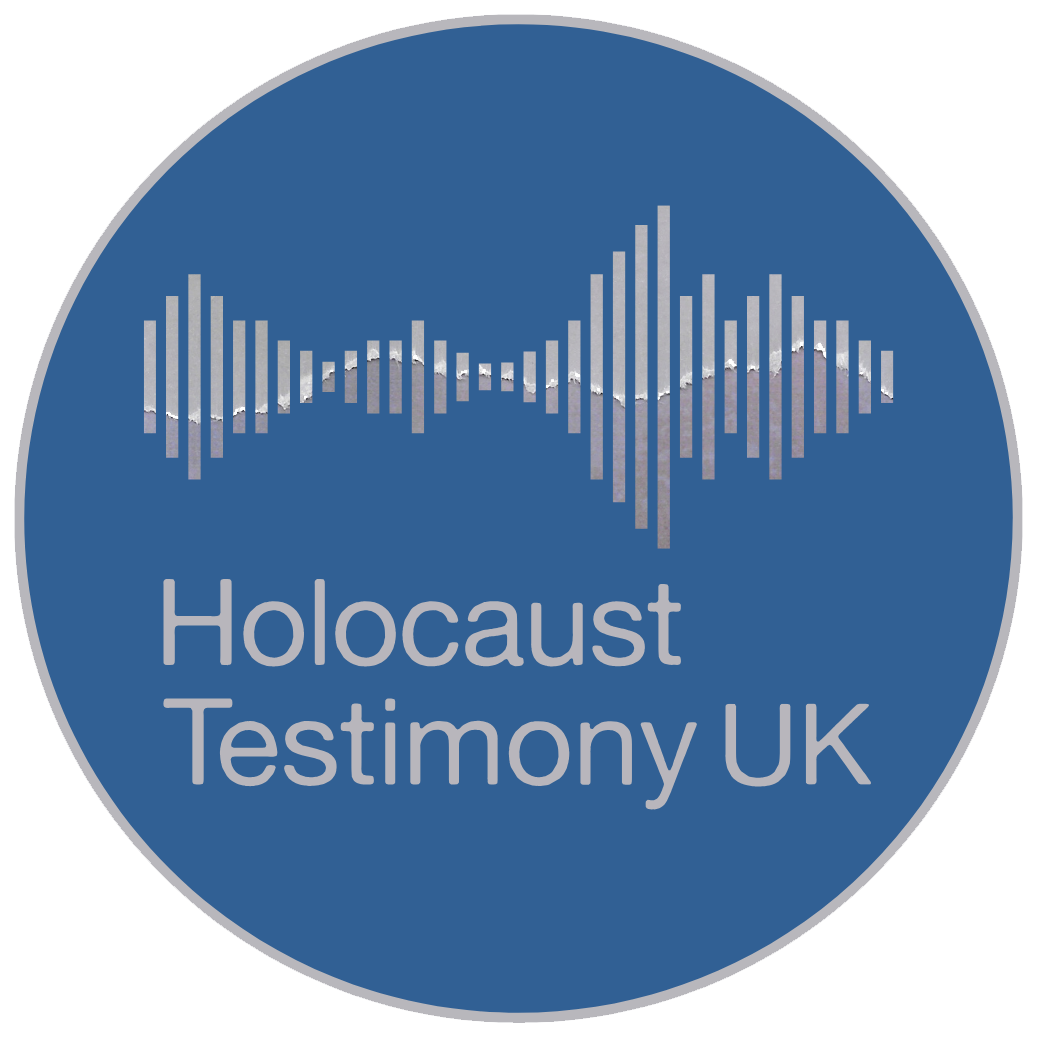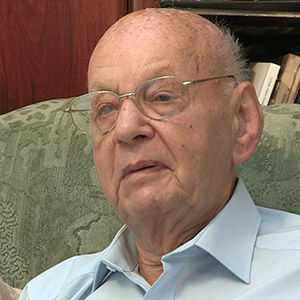External Links
Interview(s) below aren't available on our site but may be available online from partner sites. If not, please contact the partner archive directly to arrange access.

Interviewee Summary
Fred Stern was born in Vienna on 12 August 1923, and lived on the canal side of the then predominantly Jewish 2nd District, which together with the 20th District formed an area between the Donaukanal (Danube Canal) and the Danube. His parents, Robert and Olga, had also been born in Vienna (01.07.1899 and 03.01.1899), though like many other citizens his grand-parents originally came from Budapest and Moravia respectively, and Stern enjoyed working holidays on the Moravian farm.
In term-time, while his mother was at business and his father ran a shop and sold carpets, Stern attended the Volkschule (junior school), where he learnt about the glories of the Austrian Empire and Vienna’s magnificent buildings, but where Jewish and Aryan pupils were segregated. This was ‘not generally a problem’, except when Aryan pupils using his classroom for religious lessons complained that ‘it smelled.’ Anti-Semitism was rife in Vienna, Stern recalled. As ‘a doer’, aged ten he opted to pursue his education from class three at the Realgymnasium, with its focus on science, mathematics and technology, rather than at the language-orientated Gymnasium (both very similar to a grammar school). He remained there until the Anschluss in March 1938, when Jewish children had to leave school, and from his home watched Hitler crossing a bridge into the city.
Foreseeing that ‘English might come in useful one day’, an aunt paid for Fred Stern’s English lessons. Indeed, some of Olga’s relatives had already emigrated to Bournemouth, and she joined them just before Kristallnacht (November 1938). Resident domestic service (or nursing) was essentially the only means of entry to Britain for refugee women then, regardless of background or experience, and she first worked in Brondesbury Road, Kilburn NW6, then as a cook in Swanage, Dorset. Her son followed her on the Kindertransport via Germany, Hoek of Holland and Harwich in January 1939, but had to stay in a youth hostel with German boys who regarded him and his Austrian-German as ‘very different.’ English boys at his school were ‘extremely helpful’, however and brought him detective story books. Through Fred’s approaches to English families, the customary £50 guarantee was paid for his father, and work was found for both parents in a house together, enabling Robert Stern to enter Britain shortly before World War Two commenced in September 1939.
On leaving school, Fred worked as a hotel dish-washer, and ‘fixed’ items for Lilliput radio firm, but the war rendered refugees suspect and subject to tribunals to establish the security risk they represented. British policy hardened in May 1940; Austrians were treated as Enemy Aliens, and widely (re)classified as ‘A’ ‒ to be interned. Both Robert and Fred Stern were questioned at the police station: did they belong to the National Socialist Party in Austria? …The Russian Communist Party? ...What had they done in Austria? When Fred’s possessions in the hostel were searched, police removed a child’s Morse code set from his Pathfinder (Boy Scouts) days in Vienna, ‘in case he stood on the beach and communicated with Germany.’ Deemed an adult at sixteen, he was arrested as a member of an enemy state on 3 May 1940, and later interned in Douglas Camp on the Isle of Man, where soldiers stood in the sea with fixed bayonets when internees went swimming.
Father and son did not meet during their internment. Robert Stern was eventually released; Fred was sent overseas with other internees and German POWs, despite being Jewish and protesting his innocence. He could choose between Canada and Australia, and chose the former ‒ ‘nearer to Britain.’ During the eight-day journey, SS Sobieski was saved from a Nazi U-boat attack; SS Arandora Star, also carrying internees and POWS, was sunk on 2 July 1940. Fred’s mother received a Home Department letter stating that he had drowned on Arandora Star ‒ one day after receiving a telegram confirming his safe arrival in Canada, sent via family friends in New York.
French Canadians shouted abuse at internees (still regarded as Enemy Aliens), arriving along the Lawrence River and proceeding to Trois-Rivieres (Three Rivers) in Quebec. At Camp T, some 3,000 miles from Britain, internees were greeted by German POWs who prepared the food and sang Nazi songs that revelled in spilling Jewish blood; Jewish internees thus insisted on living in separate quarters, and cooking their own food. Numbers swelled ‘from a few hundred to thousands.’ Conditions were basic at best in Camp A, but ‘One manages everything and anything if one has to.’ Fred made camouflage nets for Britain’s war-effort, and went tree-felling in winter temperatures of -20°F, with a ‘huge red spot’ woven into the clothing to mark them as POWs - in case someone ran away. Despite then being moved to Camps B and N (all were near Quebec), Fred managed to study for the Toronto University matriculation examination. The men were allowed to send and receive one letter every two weeks, but in case of problems, Fred avoided informing his mother of his return to Britain in July 1942 on SS Capetown Castle: on seeing him at the door ‘she screamed!’ Her hair had turned white in his absence, he noted; she had also moved, as Aliens were obliged to leave coastal areas for security reasons. Later, though, Robert and Olga established a jewellery business in Cardiff.
Fred Stern was released from internment as a ‘budding engineer with a good report’, but adjusting to life in Britain again took time. Determined to complete his studies, he sat the English matriculation examination, and over several years took evening classes, specializing in computer studies, binary systems, electrical subjects and psychology. A broad range of wartime and peacetime contributions through projects, designs and inventions described in the film, not only bears witness to his success, but also provides an insight into developments now taken for granted. For example, at Metalbox, Stern was involved in experiments with foods and their potential preservation time in a freezer; he later designed a machine to track Britain’s Telstar satellite, and for the Royal Mint he designed the shape of the 50p piece plus the requisite machinery. ‘I’ll tell Mum!’ Prince Charles told Stern at Clarence House. They met 2008 on the 70th anniversary of Stern’s arrival in Britain, and again on the 75th anniversary in 2013, when the Association of Jewish Refugees (AJR) and the Prince commemorated the Kindertransports.
Stern was with the British Standards Institute (BSI), testing assessing and certifying machinery, at a time when Germany was a major importer of British machinery, so he ‘set aside reservations against Germany when there on business, though he disliked the German accent.’ Naturalized in 1949, he could become a British citizen, but never an Englishman a policeman told him ‒ ‘as though it were a punishment.’ Stern was ‘indebted for life here, but it is in me to be different.’ He has visited Vienna, ‘but the family did not share the same feeling about place’; ‘there was a gap between Fred and his daughters regarding identity.’
Additional Comments:
This interview is potentially of special interest to researchers of émigré inventors, technical designers and engineers.
Key words:
Bournemouth, Britain, Budapest, SS Sobieski, Canada,Germany, Isle of Man- Douglas camp, Moravia, Quebec, Swanage, Vienna, AJR, internment Canada, Kindertransport,

Testimonies
18 October 2015
Institution
External Link
External Link
External Link


INTERVIEWEE:
Fred S.
Born:
1923
Place of birth:
Vienna

Photos
Caption
Institution
External Link
External Link
External Link

Caption
Institution
External Link
External Link
External Link

Caption
Institution
External Link
External Link
External Link

Maps
Place of Birth
Vienna
Place of Interview
Location
Recorded Talks
Place of Birth
Vienna
"The whole reason that we have this interview is to let future generations know what kind of life of we had so they should have a better life, not have to suffer through all the traumas we had to suffer. As time goes on the memory of those days and the importance of it will dim, and this programme will help keep it in people's minds and hopefully let future generations have a better life. It should be a better world."
- Arnold Weinberg, AJR Refugee Voices Testimony Archive.
"The distribution of life chances in this world is often a very random bus"
- Peter Pultzer.

Experiences:
Tag
Tag
Tag


